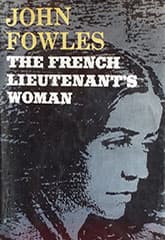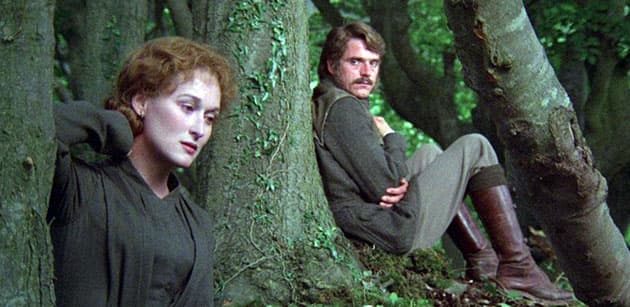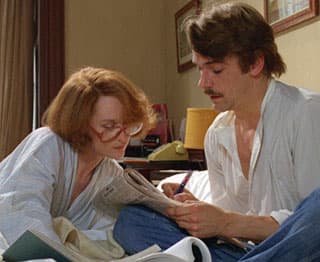The French Lieutenant's Woman
Critique • Quotes • At the movies
 First edition
First editionFirst publication
1969
Literary form
Novel
Genre
Literary, historical fiction, postmodern
Writing language
English
Author's country
England
Length
Approx. 148,500 words

Meryl Streep and Jeremy Irons each play dual roles in The French Lieutenant's Woman in 1981.
Impossible film works brilliantly
The French Lieutenant's Woman (1981): Film, 127 minutes; director Karel Reisz; writer Harold Pinter; featuring Meryl Streep, Jeremy Irons, Hilton McRae, Lynsey Baxter, Leo McKern
As written by John Fowles, The French Lieutenant's Woman must have seemed unfilmable. Done straight, the romance set in the 1860s might attract the period costume crowd, those who fill the theatres for the latest Jane Austen adaptation or who follow Victorian dramatizations on Masterpiece television, but the 1969 John Fowles novel is not a straight take. It's more about the author dropping in and out of the story with his modern comments. You can't get lost in the storyline for very long before you're yanked out of it to consider a modern perspective on it.
All the book's literary allusions, multiple endings, and academic digressions—they have to be eliminated for any movie that wants a popular following, it would seem.
But the producers and directors did a bright thing. They got a literary figure in his own right, playwright Harold Pinter, to re-imagine the book and he does so brilliantly.
No, that's not entirely correct. The nineteenth-century story of the figure stigmatized in the seaside town as a fallen woman and the gentleman who thought he was saving her is hardly reworked at all. Except for the usual compression needed to fit a 400-plus-page novel into a two-hour film, this part of the movie is faithful to the novel. Incredibly so, actually. To the point of using much of the same dialogue.
What's changed dramatically in Pinter's screenplay is the meta-narrative part of the novel. The period drama is no longer presented within the novel as being written by a twentieth-century author, but as being filmed in contemporary times. Meryl Streep and Jeremy Irons play the novel's leads, Sarah Woodruff and Charles Smithson, in the period drama part of the film, as well as the actors, Anna and Mike, who play them. We see Anna and Mike on the set where The French Lieutenant's Woman film-within-the-film is being shot and in their private quarters as they rehearse, discuss the story and carry on an adulterous affair of their own.
This is not as confusing as it may sound. It actually brings a kind of lightness to the production, not so apparent in the novel. As moderns, Streep and Irons, exhibit a laid-back, fun relationship that doesn't undercut the intense, dramatic unfolding of the period tale, but enhances it. At least for the first half of the film.
As the double plot unfolds, the modern affair enters deeper waters while the period relationship works through its tragedies and mishaps until eventually sailing into a sunnier place. That's how the film remains true to the novel's optional happy and sad endings laid out for Charles and Sarah in the novel—without confusing or turning off audiences. (An earlier false ending in the novel is excised entirely. Three levels of storytelling would have been too much.)
Mysterious or aloof?
The film's promotion teased the mysterious Woman of the title, the half-hidden face beneath the cowl, on the wind and water-whipped sea wall. But some critics found Streep is actually better as the woman's modern counterpart. She's not a romantic actress and when she is playing Sarah what should come across as mystery can seem more like aloofness and confusion, until near the end when Sarah herself figures out who she is.
As Anna, the modern actress, she is less likable, more matter-of-fact and more aware of what she's doing—but that's what the character is supposed to be.
The official trailer for The French Lieutenant's Woman.
The theatrically trained (and British, to boot) Irons seems better suited to the period piece. As Charles he is appealing at times, snooty at other times, sometimes strong and sensitive, sometimes weak and oblivious, just as in the novel—a conflicted gentleman of his times. Ditto for his appearances as Mike, with maybe a little more stress on the obliviousness.
The film is mainly a two-hander, but Streep and Irons are ably supported by U.K. actors who inhabit their roles seamlessly, including the always wonderful Leo McKern as Charles's blustery confidante Dr. Grogan.
Actress Streep and writer Pinter are the two people involved in The French Lieutenant's Woman who received the most attention for awards.
In the end it is not a perfect film, but it's pretty good. And probably the best adaptation that could have been made of that tricky book.
— Eric


